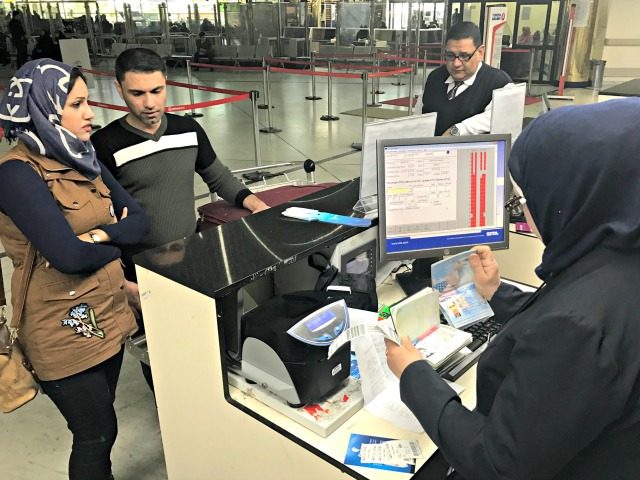U.S. President Joe Biden’s move to dramatically expand the refugee admissions cap with the stroke of a pen is his most unpopular executive order so far, a new Morning Consult/Politico survey revealed Wednesday.
According to the poll, conducted February 5-7, nearly half (48 percent) of all 1,986 registered voters surveyed strongly or somewhat oppose the president’s refugee plan.
Meanwhile, 39 percent strongly or somewhat support more refugee admissions, and 14 percent had no opinion.
The pollsters declared:
A new Morning Consult/Politico survey shows 48 percent of voters oppose Biden’s plan to allow as many as 125,000 refugees to seek safe haven in the United States during the upcoming fiscal year — a historic high that represents a whiplash change from the historically low 15,000-person limit for the current fiscal year — and fewer than 2 in 5 voters support it.
The change between the refugee admissions limit for FY 2021 set by the Trump administration and the cap proposed by Biden for the upcoming fiscal year marks a more than eight-fold increase.
Of 28 executive actions tracked by the pollsters since Biden’s inauguration on January 20, the February 4 order to increase the refugee admissions cap is the least popular “by a wide margin,” the pollsters found.
“Orders pertaining to immigration and immigrant rights constitute five of [Biden’s] seven least popular actions among voters and are particularly animating for Republicans,” they added.
Opposition to expanding the number of refugees allowed into the U.S. was more pronounced among Republicans (76 percent) and Independents (52 percent).
However, the pollsters proclaimed:
[T]he move to allow more refugees into the country [does not] resonate particularly deeply with the president’s own base. While 61 percent of Democratic voters support the expansion — and 33 percent “strongly support” it — that share places the executive order at the bottom of the list as well.
Nearly three-quarters of GOP voters (76 percent) strongly or somewhat oppose Biden’s refugee plans, while 13 percent strongly or somewhat support it. Eleven percent had no opinion.
The pollsters pointed out:
Three in 5 GOP voters “strongly oppose” raising the refugee cap to 125,000 people, roughly the same share who also strongly opposed Biden’s decision to end taxpayer-funded construction of the U.S.-Mexico border wall and the Trump administration’s ban on immigration and travel from several predominantly Muslim countries.
Only the administration’s move to include undocumented immigrants residing in the country in the census count drew sharper opposition from Republicans (66 percent).
Among Independent voters, more than half (52 percent) strongly or somewhat oppose admitting more refugees in the U.S., while 33 percent strongly or somewhat support it. Fifteen percent had no opinion.
The pollsters noted:
The 37 percent of independents who strongly oppose raising the refugee cap is also this group’s highest level of dissent against the orders tracked so far, followed by Biden’s move to pause the Trump administration’s “Remain in Mexico” policy for asylum seekers (33 percent).
President Biden has reportedly proposed raising the 15,000-refugee cap for this fiscal year, as the coronavirus pandemic plagues the country, by more than four-fold to 62,500. However, that revelation was not part of the survey.
In setting the FY 2021 limit at 15,000, the Trump Administration noted in a report to Congress:
This proposed refugee admissions ceiling reflects the continuing backlog of over 1.1 million asylum-seekers who are awaiting adjudication of their claims inside the United States, and it accounts for the arrival of refugees whose resettlement in the United States was delayed due to the COVID-19 [coronavirus disease] pandemic.
This week, Biden’s State Department acknowledged that the 125,000-person limit for next year is an “ambitious target,” highlighting the challenges the administration faces in reaching that figure, including the backlog.
“It will take some time for us to get to those targets, precisely because, in this case, the U.S. refugee admissions process had essentially come to a standstill in recent years,” Ned Price, a State spokesman, said Tuesday.

COMMENTS
Please let us know if you're having issues with commenting.